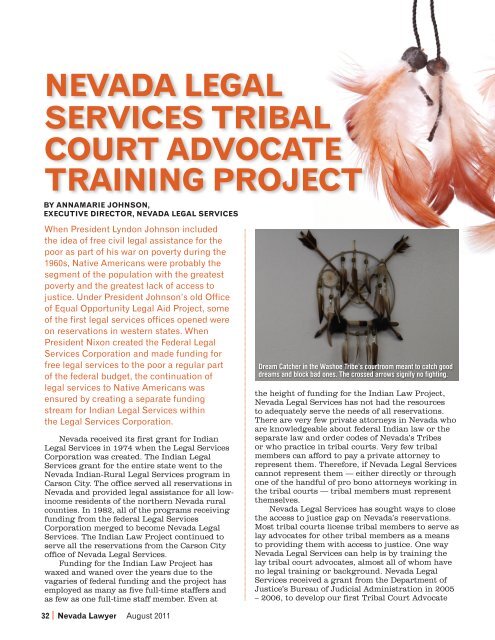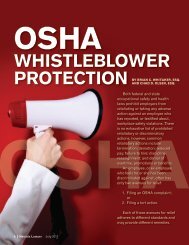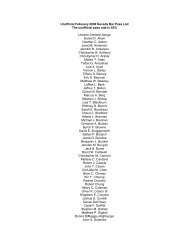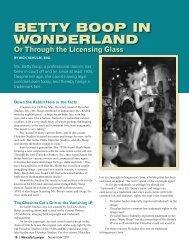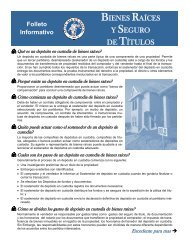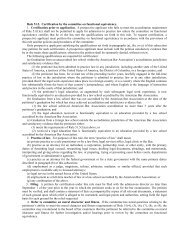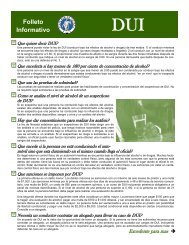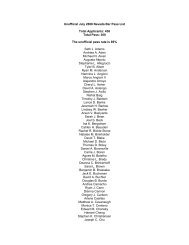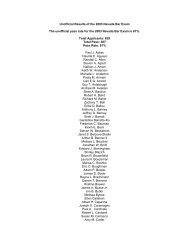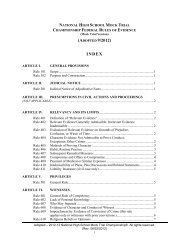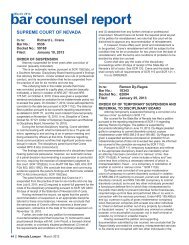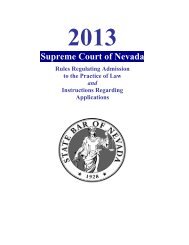nevada legal services tribal court advocate training project
nevada legal services tribal court advocate training project
nevada legal services tribal court advocate training project
You also want an ePaper? Increase the reach of your titles
YUMPU automatically turns print PDFs into web optimized ePapers that Google loves.
NEVADA LEGAL<br />
SERVICES TRIBAL<br />
COURT ADVOCATE<br />
TRAINING PROJECT<br />
BY ANNAMARIE JOHNSON,<br />
EXECUTIVE DIRECTOR, NEVADA LEGAL SERVICES<br />
When President Lyndon Johnson included<br />
the idea of free civil <strong>legal</strong> assistance for the<br />
poor as part of his war on poverty during the<br />
1960s, native Americans were probably the<br />
segment of the population with the greatest<br />
poverty and the greatest lack of access to<br />
justice. Under President Johnson’s old office<br />
of equal opportunity Legal Aid Project, some<br />
of the first <strong>legal</strong> <strong>services</strong> offices opened were<br />
on reservations in western states. When<br />
President nixon created the Federal Legal<br />
<strong>services</strong> Corporation and made funding for<br />
free <strong>legal</strong> <strong>services</strong> to the poor a regular part<br />
of the federal budget, the continuation of<br />
<strong>legal</strong> <strong>services</strong> to native Americans was<br />
ensured by creating a separate funding<br />
stream for indian Legal <strong>services</strong> within<br />
the Legal <strong>services</strong> Corporation.<br />
Nevada received its first grant for Indian<br />
Legal Services in 1974 when the Legal Services<br />
Corporation was created. The Indian Legal<br />
Services grant for the entire state went to the<br />
Nevada Indian-Rural Legal Services program in<br />
Carson City. The office served all reservations in<br />
Nevada and provided <strong>legal</strong> assistance for all lowincome<br />
residents of the northern Nevada rural<br />
counties. In 1982, all of the programs receiving<br />
funding from the federal Legal Services<br />
Corporation merged to become Nevada Legal<br />
Services. The Indian Law Project continued to<br />
serve all the reservations from the Carson City<br />
office of Nevada Legal Services.<br />
Funding for the Indian Law Project has<br />
waxed and waned over the years due to the<br />
vagaries of federal funding and the <strong>project</strong> has<br />
employed as many as five full-time staffers and<br />
as few as one full-time staff member. Even at<br />
32 Nevada Lawyer August 2011<br />
Dream Catcher in the Washoe Tribe’s <strong>court</strong>room meant to catch good<br />
dreams and block bad ones. The crossed arrows signify no fighting.<br />
the height of funding for the Indian Law Project,<br />
Nevada Legal Services has not had the resources<br />
to adequately serve the needs of all reservations.<br />
There are very few private attorneys in Nevada who<br />
are knowledgeable about federal Indian law or the<br />
separate law and order codes of Nevada’s Tribes<br />
or who practice in <strong>tribal</strong> <strong>court</strong>s. Very few <strong>tribal</strong><br />
members can afford to pay a private attorney to<br />
represent them. Therefore, if Nevada Legal Services<br />
cannot represent them — either directly or through<br />
one of the handful of pro bono attorneys working in<br />
the <strong>tribal</strong> <strong>court</strong>s — <strong>tribal</strong> members must represent<br />
themselves.<br />
Nevada Legal Services has sought ways to close<br />
the access to justice gap on Nevada’s reservations.<br />
Most <strong>tribal</strong> <strong>court</strong>s license <strong>tribal</strong> members to serve as<br />
lay <strong>advocate</strong>s for other <strong>tribal</strong> members as a means<br />
to providing them with access to justice. One way<br />
Nevada Legal Services can help is by <strong>training</strong> the<br />
lay <strong>tribal</strong> <strong>court</strong> <strong>advocate</strong>s, almost all of whom have<br />
no <strong>legal</strong> <strong>training</strong> or background. Nevada Legal<br />
Services received a grant from the Department of<br />
Justice’s Bureau of Judicial Administration in 2005<br />
– 2006, to develop our first Tribal Court Advocate
<strong>training</strong> program<br />
and the program<br />
was very successful.<br />
Many graduates<br />
of the program<br />
were tapped to<br />
serve as judges,<br />
prosecutors<br />
and other<br />
<strong>tribal</strong> <strong>court</strong><br />
personnel. This<br />
helped strengthen<br />
the <strong>tribal</strong> <strong>court</strong>s; but<br />
it did not help increase<br />
the assistance available<br />
for <strong>tribal</strong> members with<br />
cases in <strong>tribal</strong> <strong>court</strong>s.<br />
Unfortunately, the funding<br />
for our <strong>training</strong> programs was<br />
cut and Nevada Legal Services<br />
could not continue to provide the<br />
<strong>training</strong>.<br />
With the Tribal Law and<br />
Order Act of 2010 signed into law last<br />
summer, the need for representation in <strong>tribal</strong> <strong>court</strong><br />
only increased. The act allows tribes to opt into an<br />
increase in their <strong>court</strong>s’ jurisdiction. Tribal <strong>court</strong>s<br />
would no longer be limited to imposing sentences in<br />
criminal cases to just one year in jail. Tribal<br />
<strong>court</strong>s can now impose sentences of up to<br />
three years in jail if the tribe decides to opt<br />
in. When a tribe opts in they are required<br />
to ensure that <strong>tribal</strong> members have access<br />
to representation in all criminal matters.<br />
While Nevada Legal Services (NLS) has<br />
received new funding this year to provide<br />
direct representation of individuals in <strong>tribal</strong><br />
<strong>court</strong>s, it is not enough to cover the cost<br />
of hiring new staff to represent all of those<br />
who will need <strong>legal</strong> representation. NLS<br />
applied to the State Bar of Nevada’s LRIS<br />
program for a grant to revive the Tribal<br />
Court Advocate Training program. NLS was<br />
awarded a grant of $20,000 and the new<br />
program will began this summer.<br />
The Tribal Court Advocate Training<br />
program is an intense multi-day National<br />
Institute of Trial Advocates (NITA)-style<br />
<strong>training</strong> for <strong>advocate</strong>s. The first day of<br />
the <strong>training</strong> is dedicated to instruction<br />
on federal Indian law and <strong>tribal</strong> law and<br />
order codes. During the remaining days<br />
of the <strong>training</strong>, <strong>advocate</strong>s are taught the<br />
rules of evidence, the rules of criminal<br />
procedure and the methods of preparing a<br />
case for trial through a system of lectures<br />
and skills exercises. On the first day, the<br />
<strong>advocate</strong>s are assigned to teams for the<br />
prosecution and defense and throughout<br />
the skills <strong>training</strong> exercises, the <strong>advocate</strong>s<br />
use their case materials to learn direct and<br />
cross-examination, opening and closing arguments,<br />
motion practice and witness preparation. On the<br />
final day, the criminal case is presented to the<br />
judge and goes to jury for a verdict. The <strong>advocate</strong>s<br />
receive a certificate of completion upon graduating<br />
from the class. The certificate allows the <strong>advocate</strong><br />
to call upon the <strong>training</strong> staff during the next 12<br />
months for assistance in cases the <strong>advocate</strong> has in<br />
<strong>tribal</strong> <strong>court</strong>. The <strong>training</strong> staff is available to answer<br />
questions, edit and review pleadings, give advice<br />
on trial strategy or preparation and even to sit as<br />
second chair in a trial. At the end of the year, NLS<br />
will survey our graduates and ask what they would<br />
like to see in a follow-up <strong>training</strong> and will then<br />
conduct <strong>training</strong> on the most requested topics.<br />
The Tribal Court Advocate Training <strong>project</strong><br />
will conduct two multi-day NITA-style <strong>training</strong><br />
sessions: one in the Elko area and one in the Carson<br />
City area. A year later, there will be two follow-up<br />
<strong>training</strong> sessions, again in the Elko area and the<br />
Carson City area.<br />
aNNamarIe JOhNSON is the executive director of<br />
Nevada Legal Services. She has been an attorney for 26<br />
years and has spent her career in Indian Legal Services.<br />
Before moving to Nevada, she was the director of the<br />
largest Indian <strong>legal</strong> <strong>services</strong> program in the United States.<br />
August 2011 Nevada Lawyer 33


